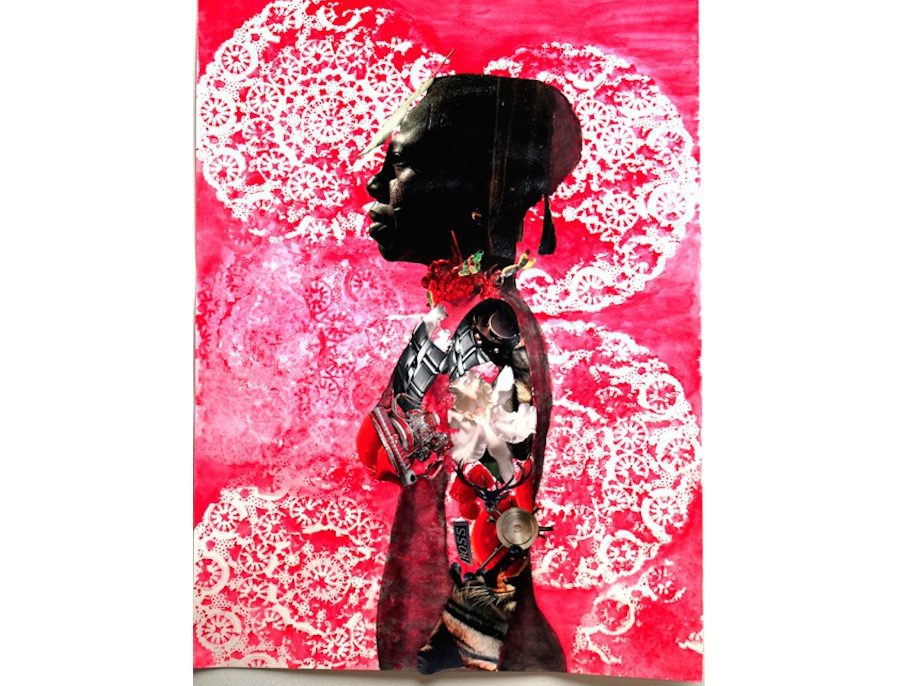California Institute of the Arts (CalArts) , Los Angeles, United States
14 Nov 2014 - 15 Nov 2014

Krista Franklin, Do Androids Dream of How People Are Sheep?, 2010. Mixed media on watercolor paper, 24 x 30 inches. Photo: Stephen Flemister. Courtesy of and © Krista Franklin.
Curated by MA faculty Douglas Kearney, this year’s conference will continue the MA program’s investigation into contemporary digital culture from a Black Studies perspective.
FRIDAY, NOVEMBER 14 @ REDCAT 8:30-10:00AM
KEYNOTE ADDRESS FEENIN’: R&B’S TECHNOLOGIES OF HUMANITY
This lively multimedia talk by writer and scholar Alexander Weheliye, professor of African American Studies at Northwestern University, is the launching keynote for a multi-event conference focusing on Black digital culture. Weheliye, author of Phonographies: Grooves in Sonic Afro-Modernity, gives a critical history of the intimate relationship between R&B music and technology since the late 1970’s. Weheliye also authored Habeas Viscus: Racializing Assemblages, Biopolitics and Black Feminist Theories of the Human.
SATURDAY, NOVEMBER 15 @ THE WEST HOLLYWOOD PUBLIC LIBRARY
9:30-10:15AM
A NEW NORTH STAR?: An orienting conversation
Here, members of the panels will respond to prompts designed to launch the day’s dialogue. This will be a less formal conversation.
10:25AM-12n
PANEL 1: 3/5s of a PROFILE?: THE BLACK CYBER BODY
With its proliferation of images, comment flame wars, and its working of utility into entertainment and entertainment into utility, the Internet is a teeming site of racial(ized) performance. How do Black users—from gamers, to artists, to students, to shoppers—whose bodies have historically served as entertainment/utility navigate, transform, and engage the digital realm? Is it an emancipatory frame, a Global Interzone, or just another block (barricade, ‘hood, and/or auction)?
Panelists: Jennifer González, Simone Browne, Victoria Hungerford
Moderated by Douglas Kearney or James Wiltgen
1:25-3PM
PANEL 2: THE STOOP 3.0: COMMUNITY REMIXED FOR THE DIGITAL PRESENT
Community incubates activism, discourse, culture, and conflict. Imperialism and colonialism forced the concept of “Nation” to abandon the characteristic of geographic proximity, a conceptual change whose implications postcolonialism and global capitalism wrestle today. Does digital culture, which only seems omnipresent, reinscribe colonial reach and if so, is it capable of revising it? What is our understanding of social media as a tool for building communities, activism, and what are the natures of these new aggregates?
Panelists: Anna Everett , Stephanie Greenlea
Moderated by Chandra Khan
3:20-5PM: PANEL 3: TALKING CLOUD: (RE)MEMORY, DIS-MEMORY, AND THE NEW-OLD ARCHIVE(S)
The information is out there, and, perhaps for some—way way out there; of course, it’s also back there when we are speaking of memory. Yet the digital transforms the concept of “there” and of memory, eliminating geographical distances and putting in work on temporal ones as well. What does this mean for members of the African diaspora who have, for reasons before and after the Middle Passage, pursued the reckoning and recovery of histories, genealogies, and cultural inheritances to produce existential integrity, popular art, and scholarship? How is The Archive(s) both transformative and transformed in the Digital Era.
Panelists: Thomas Allen Harris, Tisa Bryant
Moderated by Norman Klein
5:15-6PM
CONCLUDING DISCUSSION
The MA Aesthetics and Politics offers a one-year degree that encourages interrogations of the arts and politics in an expanded field. Students specialize in Critical Theory, Global Studies, or Media and Urban Studies, and get up close and personal with key contemporary artists and thinkers, including Theorist-in-Residence Judith Butler (spring 2015) and guest lecturer Jacques Ranciere (spring 2015).
REDCAT
631 W. 2nd Street
Los Angeles, CA 90012
West Hollywood Public Library
Common Room
625 N. San Vincente Blvd.
West Hollywood, CA 90069
aestheticsandpolitics.calarts.edu